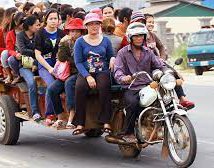Garment and footwear workers worldwide are especially susceptible to injuries and deaths caused by commuting accidents. Nike, writes the @SourcingJournal, wants to help understand why. [Nike Takes New Approach to Factory Worker Safety – SJ]
The sportswear juggernaut on Monday announced that it will be working with the International Labour Organization’s (ILO) Vision Zero Fund to develop an adaptable but standardized approach to reduce these accidents in different contexts. This includes seeking input from workers, employers, governments and ILO experts in different countries to create a so-called theory of change on road safety that “throws light” on the root causes of road accidents involving garment and footwear workers.
The partnership will also create practical and easy-to-use guidance materials on commuting safety, which will be piloted by Nike and the Vision Zero Fund in a country with contract facilities that churn out Nike products. (Like most fashion purveyors, the Drake collaborator does not own its own factories.)
“At Nike, we know a world-class supply chain is grounded in standards that demonstrate respect for the people who make and move our product, and the principles of a healthy and safe workplace,” said Sittichoke Huckuntod, the Oregon company’s director for health and safety. “With this joint initiative on road safety, we look to expand our collaboration with the Vision Zero Fund, which we feel will help Nike manufacturers be leaders in safety across the extended supply chain and beyond.”
Huckuntod said all people have a “fundamental right” to the protection of life and health in workplaces across Nike’s value chain, including those operated by its suppliers. This, he added, is reflected in the Just Do It company’s 2025 health and safety target, which aims to build “world-class safe and healthy workplaces for the people making our product.”
The broad strokes of why garment and footwear workers are disproportionately involved in road accidents are there: Most employees in the sector have to travel long distances on overcrowded public or collective vehicles, such as trucks and motorcycle carts, that share congested roads with heavy commercial transports. Poor national traffic safety is another issue. In Cambodia, the first half of 2022 saw 1,630 accidents and 53 deaths involving factory workers, an increase of 22 percent from the same period a year before, government statistics revealed. Nearly 40 percent of the pileups were caused by speeding.
But existing laws and enforcement mechanisms often focus on vehicle drivers, which “falls short when it comes to providing sustainable solutions,” said Ockert Dupper, global program manager for the Vision Zero Fund, which is part of the ILO’s broader Safety & Health for All program to improve the health and safety of workers everywhere.
“This is why we are excited about the partnership with Nike,” Dupper said. “It gives us an opportunity—in collaboration with ILO’s Better Factories Cambodia—to identify the underlying causes beyond vehicle drivers that need to be addressed to reduce injuries and deaths from road accidents, and to collectively develop a more powerful and standardized approach to reduce commuting accidents in the garment supply chain.”


